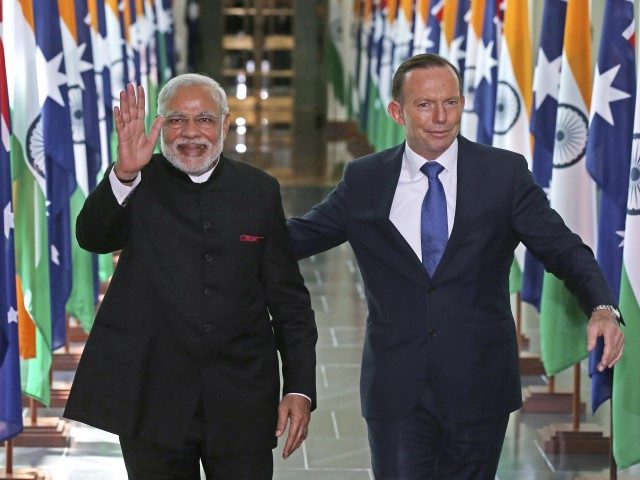In an interview this week, Former Australian Prime Minister Tony Abbott, now a special trade envoy to his successor Scott Morrison, told India’s World Is One News channel (WION) that Australia was looking to expand trade with India specifically to limit ties to China.
“For economic reasons, we’re gonna have to replace China in supply chains and frankly, there is no better substitute for China and so many of their supply chains than India, given India’s very sophisticated manufacturing base,” Abbott told WION in remarks published on Monday.
“That’s why China is not a trustworthy partner at the moment. China has been weaponizing trade against us, China has been either bribing or bullying other countries right around the region, including quite close to India, and this is just not right,” he added. “Relationships have got to be on a fair, honorable and transparent basis and that hasn’t always been the case with China.”
“Given that it [China] can weaponize trade, I would love to see a very large proportion in Indian hands. Let’s aim for $100 billion bilateral trade,” Abbott similarly said about a plan that seeks to transform the economic relationship between Australia and India, at an event on Tuesday promoting the India Economic Strategy 2035.
India and Australia signed a free trade agreement (FTA) on April 2. The deal, titled the “Australia-India Economic Cooperation and Trade Agreement (ECTA),” took over a decade to negotiate. It aims to exponentially increase the bilateral trade between both countries, but also to replace Australia’s dependency on China’s supply chains.
“Today, we open one of the biggest economic doors there is to open in the world,” Morrison said following the signing of the deal.
The agreement will seek to increase annual bilateral trade between both countries from $27.5 billion in 2021 to $45 billion (USD) over the span of five years. It also aims to increase the duty-free imports of Indian goods into Australia to 96 percent of imports, eliminate more than 85 percent of tariffs on Australian goods exports to India, end liquified natural gas tariffs, and boost services exports from India to Australia.
While China’s investment in Australia has diminished as of late, it has spent more than $153 billion in Australia in order to exert influence and take ownership of Australian assets.
In an official statement, Indian Prime Minister Narendra Modi expressed that, “On the basis of this agreement we will be able to increase the resilience of supply chains, and also contribute to the stability of the Indo-Pacific region.”
Both India and Australia have strained relationships with China. India and China are part of an ongoing standoff that resulted in a military battle across the Himalayan border as part of the officially denominated “Line of Actual Control” (LAC) in the Ladakh region, with 20 Indian soldiers and 40 Chinese soldiers reported killed in 2020, according to the Indian government. China has denied the tally.
Australia has been subject to trade coercion by China, such as China blocking Australia’s exports after Australia called for an independent review into the origins of the Chinese coronavirus. In retaliation, China has submitted Australia to a “shadow trade war” with increased tariffs on Australian exports.
Chinese Foreign Minister Wang Yi said in late 2020, “If Australia sees China as a threat, then the improvement of this relationship would be difficult.” A year later, China announced the suspension of economic dialogue with Australia after the latter withdrew from two projects tied to China’s Belt and Road Initiative (BRI).
Australia’s Home Affairs Minister Karen Andrews recently accused the Chinese government of interfering in the upcoming Australian May 21 elections after the announcement of China’s signing of a security deal with the Solomon Islands. Leaked documents indicate that the deal could allow the installation of a Chinese military base in the Solomon Islands.
At an event organized by the Australia India Institute during early April 2022, Barry O’Farrell, the Australian High Commissioner to India, made mention of China’s actions against both countries by saying that “there is a Panda in the room.”
“India has faced border tensions, Australia has faced economic (problems), we are facing a new challenge in the Pacific, those issues are not going to disappear overnight,” he added.

COMMENTS
Please let us know if you're having issues with commenting.